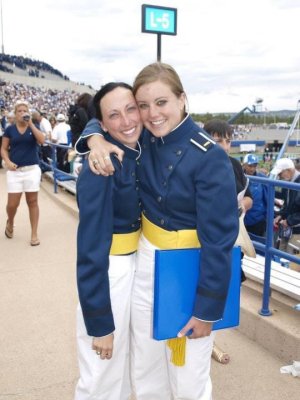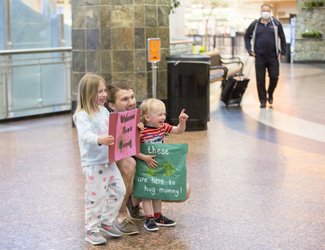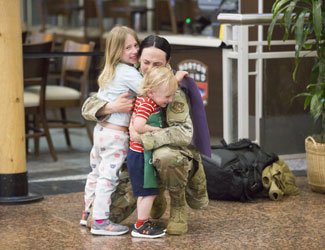I Wanted My Life as a Mom Separate From My Work With Death. I Had to Make Room for Both.
The sun clung to the horizon at four p.m. that November day in Alaska. From my office, I quickly did the calculations—if I left now, I would have just enough time to scoop up my children from daycare and fit in 20 minutes of sledding before darkness fell.
I plunged my hand into the community candy bowl and pulled out four red-foiled Hershey’s kisses on the way out of the office. A few minutes later, my five-year-old daughter and three-year-old son sat behind me in our Chevy Traverse, their excitement at being picked up early elevated by chocolate and the promise of sledding.
As they negotiated who would get to ride the orange sled first—it was the fastest—I felt the dancing vibration of my phone in the cupholder. I planned to ignore it until I glanced at the screen and recognized the number.
“Hello. It’s Michael,” said the voice on the line, identifying himself from one of the funeral homes in Anchorage.

Katherine Witt with her college roommate at their graduation from the United States Air Force Academy in 2012. Photo courtesy of the author.
I had spent months trying to develop friendly relationships with the local funeral directors, insisting they call me by my first name and frequently asking about weather, sports, or holiday plans before we got down to business. I quickly learned that Michael was not interested in small talk. He gave short answers before bringing the conversation back to the work at hand and did not hesitate to use an irritated tone when he thought I called too often for updates or suggested an alternate time for an inspection.
The first time we worked a case together, I asked how long it would take to embalm. His reply was curt: “I’ll call you when I’m done.”
This day was no different. “Can you be here by 5:15?” Michael asked in his deep, mechanical voice. “We just received the remains from the medical examiner, and tomorrow we have services all day.”
As a mortuary officer for the Air Force, my job was to inspect the remains of a deceased service member on three occasions: before any preparation of the body took place; after the remains were cleaned and prepared, which might include embalming; and after the remains were fully dressed and ready for services. Most families elected to have their loved one buried or cremated in the service dress uniform, and my role also included making sure the uniform looked presentable and respectable, with all required and requested accouterments.
For months, I had been able to manage most of my trips to the funeral home during work hours or nights when my husband, Jeff, was off work. Once, I’d had to call on a friend last minute to watch the kids for an hour or so. She’d fed them spaghetti with red sauce and made finger paintings.
I wanted to keep my children as far away from the mortuary and the details of my job as possible, but I couldn’t say no to Michael, who had other grieving families waiting. I had no time to call anyone for a favor.
I looked in the rearview mirror at my children, remnants of chocolate at the corners of their mouths. “Sure. I’ll be right there.”
* * *
After a quick stop at home for bathroom breaks, snacks, and a tablet I hoped had at least some charge, I piled my kids back in the car.
“Mommy, I thought we were going sledding,” came my daughter’s voice. “Why do we have to get back in the car?”
“I’m sorry,” I told her. “I just have one more work thing for tonight, and Daddy is working late at the hospital. No sledding tonight, but I’ll try to be quick and then we can fit in a bath after dinner.”
Award-Winning Journalism in Your Inbox
“Bath!” they shouted in unison.
We glided south on the Glenn Highway, listening to George Ezra. Months before, we’d gone on a family vacation to Maui. In our rented Sonata, the kids had booed our music picks of Alicia Keys and Shane Smith and the Saints. Refusing to endure Baby Shark or Disney tunes, George Ezra had become our compromise—and our island playlist. Throughout the dark Alaska winter, George gave us a much-needed reminder of blue skies and warm sand.

Katherine Witt’s family welcomes her home from deployment in May of 2020. Photo courtesy of the author.
At the funeral home, the lot was empty. So I parked in front of the curtained window that peaked into the reception room. I paused the music and twisted around to face my children.
“I need to go into that building for just a minute. You both need to stay here and strapped in. Promise me you’ll stay here and in your seats. I’ll be on just the other side of that window.”
“What movie can we watch?” my daughter asked.
“Looks like the downloads are The Incredibles or Ice Age. Promise you’ll stay here?”
“What snacks?” My daughter asked.
“Cheez-Itz, granola bar, or Goldfish.”
“Please me have candy?” My son asked.
I’d brought gummy bears but planned to use them as a bribe if needed.
“Sure. You can both have some candy now. Promise me you’ll stay and not come inside? Movie is on. You have snacks. I’ll be right back,” I told them. “Please give me your eyes. Do you promise?”
They both struggled to take their eyes off the nasally wooly mammoth on the screen. The hood of my son’s coat fell into his view so he tilted his chin up and eyed me goofily under the brim. My daughter smiled at me, showing one of her front bottom teeth half-emerged from her gums. It seemed like every week she had a new tooth fall out.
My daughter spoke for them both. “We promise, Mommy.”
I walked through the front entrance and into the foyer of the funeral home, pressing my car’s lock button over and over in my pocket. Although I knew it was coming, the first sickly wave of what I assumed to be a mixture of embalming chemicals, citrus air freshener, and wilting florals nauseated me. The familiar piano music drifted from the speakers, and stock images of waterfalls and pastures flipped on the screen above the podium with an unused guest book.
Michael heard the door latch and met me in the foyer. Without greeting, he asked, “Are you ready?”
I gave one last look through the door to my vehicle, unable to see my children through the tinted windows. I pressed the lock button in my pocket once more and nodded.

Katherine Witt reunites with her children after seven months in Afghanistan. Photo courtesy of the author.
I followed Michael through the reception room and into the preparation room. He held the door for me, and I stood at the head of the only table with remains, which was covered by a white sheet. I kept my hands clasped tightly in front of me, my fingers interlaced and knuckles white from the squeeze.
The first time I entered this room nearly seven months before, Michael told me they had a “packed house” at the time. Before I had ever been in this area of a funeral home, I imagined the behind-the-scenes rooms to be large and spacious, perhaps in the basement. But this space was only a corner of the first floor, meant for one funeral director to be working at a time. The packed house included four remains in various states of preparation. I walked past one older woman who rested in a cream-lined casket, her white hair neatly piled in a bun on top of her head. I pulled my arms in tightly, trying to minimize my frame in fear that I would accidentally brush against one of them.
Michael closed the door and came to the table and used two hands to pull the sheet away. Seeing the slack-jawed mouth of a corpse always gave me the feeling of sharp pins pressing against my chest. It was the hardest part for me to look at, though it was impossible not to stare at his face. The rest of him was harvested by the medical examiner—his corneas, bones, skin, and organs removed to help others. I walked around the table, curious and disturbed, and noticed the clean, small hole at the crown on his head.
Compared to the rest of his body, the man’s head looked intact. I turned to Michael. “I see where the bullet came out. Where did it go in?”
“He placed the barrel in his mouth.”
* * *
I thanked Michael for his time and asked him to call me once the cremation was complete. I opened the car door and, without glancing at the backseat, started our drive back home, measuring the time left until I could tuck my children in bed and be alone.
“Mommy, are we going home?” my daughter asked.
“Yes.”
“Mommy, are you okay?”
I slipped my hand from the wheel to the back of my thigh and pinched hard. I moved my eyes up, then down, up again, and down. I tilted my head back. I counted to ten. Still not trusting that I could open my mouth without a sob, I half turned my head toward the back seat and nodded.
Our Journalism Depends on Your Support
At home, my children slowly lowered themselves into the hot bath water that turned their skin pink. Neither of them muttered a complaint. I filled all of the open space in the water with rubber duckies, plastic dinosaurs, and race cars, then connected my phone to a portable speaker I set on the vanity and resumed the George Ezra playlist from the car ride. I lined the floor next to the bathtub with towels, ready to capture overshot splashes and squirts. Once they adjusted to the temperature, my children started their imaginary game with roars and vrooms.
I backed out of the bathroom and gently closed the door, turning my back and letting my body slide to the floor. The tears came rushing down my face.
This War Horse reflection was written by Katherine Emily Witt, edited by Kristin Davis, fact-checked by Jess Rohan, and copy-edited by Mitchell Hansen-Dewar. Abbie Bennett wrote the headlines.



Comments are closed.